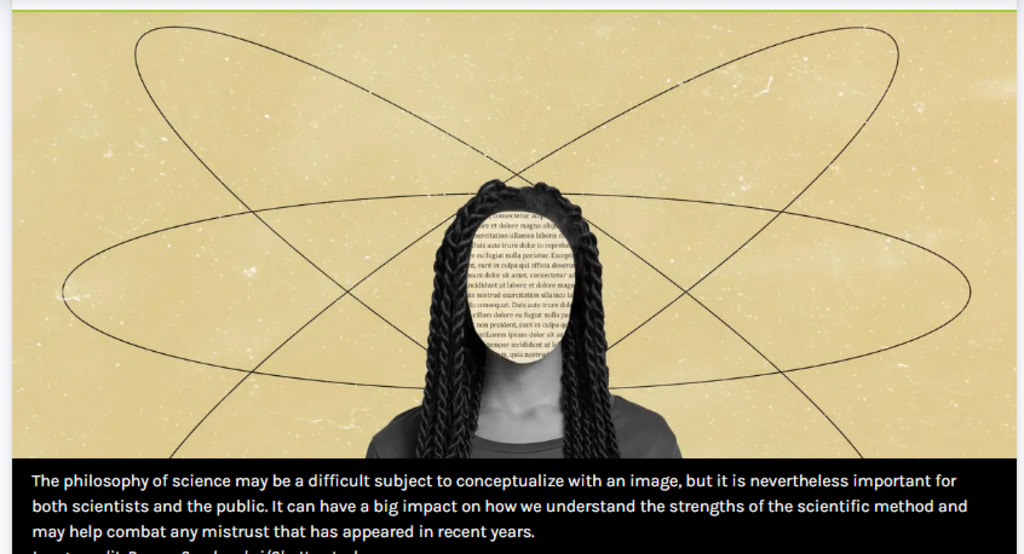The Significance Of Science Philosophy
Scientists are taught the ideals of their field, but they frequently disregard the public's perceptions and understanding of the field and its values.

Even if the philosophy of science is a challenging topic to visualize, it is nonetheless significant for the general public and scientists. It may assist dispel any doubt that has surfaced recently and have a significant impact on our comprehension of the benefits of the scientific approach.
The way the public views science has changed in recent years. Particularly in the US, the COVID-19 pandemic resulted in a little but discernible rise in public skepticism of scientists and science as a whole. A recent editorial suggests that the problem might have to do with how the general public views science philosophy, a concept that scientists frequently take for granted.
It appears that the primary accusation leveled at scientists is the notion that a significant number of them are resistant to changing their opinions in light of new information. This is probably a perplexing claim to scientists. Undoubtedly, everyone is aware of this key premise of the scientific method: one must be flexible and willing to accept the data as it comes to hand. Well, maybe not.
The dirty word is philosophy
Popular science does not usually embrace philosophy. Prominent scientists such as Stephen Hawking and physicists like Lawrence Krauss have expressed dissatisfaction with philosophy in general and the philosophy of science in particular. The former claims that philosophy is "dead," whereas Krauss is said to consider it at most an indulgence. But there are problems with viewpoints such as these.
One of the main issues is that frequently without realizing it, even those who criticize these subjects are promoting philosophical stances of their own. Consequently, they assume that the philosophy of science—that is, how we conceptualize and analyze this thing we name science, as well as its methods, assumptions, and approaches to the epistemic and metaphysical implications of its myriad theories—is self-evident.
Unfortunately, they don't seem to be, and it appears that some people view the common ideals of flexibility and the necessity of updating ideas in light of new data as weaknesses in addition to being unclear to others.
It would surprise a lot of scientists to learn that this concept has to be supported. After all, science is an ongoing process that involves revising and refining long-held theories in light of new data. Science's quest to generate findings that alter scientists' perspectives is fundamental to the discipline, and the history of science tells a compelling story of this culture of self-correction.
However, whenever science gains public attention—as it has with the pandemic and climate change, for example—those who want to discredit research may target ongoing revisions.
Premises about the scientific approach
Many people have emphasized the importance of the scientific method in our daily lives in response to the recent rise in mistrust in science and the increased spread of false information, conspiracy theories, and outright lying.
Scientists are capable of changing their thoughts, which is a strength, but when new findings or advancements are shared with the public, this ability is frequently hidden, minimized, or lost. Professor Jim Al-Khalili recently spoke with IFLScience about this issue. Science may be presented as certain and unchanging when there is a need to provide a credible and understandable explanation for complex occurrences or processes.
On the contrary, scientists should be commended more widely for their willingness to "eat humble pie" when the data calls for it.
Naturally, there are other aspects to this problem besides scientists. Stories that cover science news are sometimes oversimplified to remove any rough edges, especially by new media sites that do not have specialized journalists covering science. Consequently, Thorp argues, this attitude of certainty is reinforced by the downplaying of the cautions that frequently accompany scientific breakthroughs.
Furthermore, scientists themselves commit the "scholastic fallacy," which refers to the assumption made by academics that everyone approaches problems in the same way, as Thorp noted in his editorial. Here, scientists assume that the general public knows and interprets their research in the same way and that all research is tentative and subject to change in the future.
According to Thorp, "It will take a lot of work to reset the public's understanding of how science works, but students who get science degrees are a good place to start."
Sadly, the majority of programs consist mostly of didactic lectures on scientific concepts, with little to no emphasis placed on the philosophy and history of science. Since many science majors in college choose to work in fields unrelated to science, A change in curriculum would eventually result in a population that is better knowledgeable about how science operates, including medicine.
It would take a lot of labor to do this. It would be necessary to create new curricula that address more comprehensive issues than can be accommodated in existing packed programs. But this strategy is useful for more than just teaching more people the principles of science philosophy.
It would also make the history of science—its highs and lows that are sometimes overlooked or forgotten—more understandable to aspiring scientists and experts. Science has a rich history full of difficult subjects and events that are frequently excluded from public discussion and scientific curricula.
We'll probably continue to see misconceptions and mistrust of science and scientists unless we can address these darker topics while also appreciating the benefits of the scientific approach.






Comments
There are no comments for this story
Be the first to respond and start the conversation.